“I’ve always been fascinated by mystery, I’ve always wanted to know what was around the corner.” – John Davis, Author of Around the Corner: Reflections on American Wars, Violence, Terrorism, and Hope
Which is more spectacular, fact or fiction? John Davis’ collection of short stories opens the door to the unknown world of counterintelligence and reveals a number of personal anecdotes, stories and lessons learned over a career in counterintelligence. Join us in reading Around the Corner this month – it’s a pick anyone working in security may want to explore.
Interested in reading with us? The first 10 people to email lindy.kyzer@clearancejobs.com will get a free copy of the book.
We asked author John Davis to answer a few questions about his book, the writing process, and life after counterintelligence.
1. Around the Corner is a collection of essays – talk about that writing process. How did you decide which stories to include in the collection and how to format the readings?
I consciously set out to remark on those people who influenced me ethically and professionally. After all, my purpose in writing both my books was to show the ethical and moral issues confronted by those of us sent into the secret world on behalf of our country. So I began with ‘influences’. I mention Billy Bischoff, a World War 1 veteran, who like my father-in-law, D.L. Tedrick, introduced me to what we are hoping to keep from happening; we hope our actions in the secret world prevent us having to have 17-year-old boys confront combat and concentration camps, as in “Set the Prisoners Free”. Also, I mention some of my wise school professors who offered me insights about the need to understand before we act.
2. How important was writing in your intelligence community career? Is creative writing something you did during the course of your career, or something you pursued after?
I then wanted to write about war, confronting terrorism, violence, and illusions, taken from my career experiences. Each category requires an appreciation of others, their motives, dreams, and fears. We need to understand human nature, that is, we need to be aware of the consequences of what success looks like. Will our lives be safer, happier, more peaceful? We need to know this before we commit our youth to war and its dangerous variables. Additionally, I discuss language in depth, because I came to believe that when you know a new language, you begin to understand another world. Lastly, hope. Without hope, we become nothing more than technicians of death as an end in itself. We need to know what we are for.
3. What other writing has inspired you over the years – are there favorite books or authors specific to the intel community?
Report writing in the intelligence community was often very formulaic. However, to make a point clearly it is important to speak in unambiguous sentences. Policies and decisions might ride on what you forward in a report, so it was important to make the information clear and concise, with the source’s credibility properly assessed. On the other hand, writing articles as a facility security officer, often for people in various parts of the world, called for imagination. For instance, I invented ‘Spy Quiz’, where I took actual cases and made them into a question with four answers. Three were funny, and the last the right answer on what to do in a given, say, espionage approach. I then said at the end of each month’s quiz, “Did anything like this ever happen to you?” This was one of the best investigative lead development programs we ever had. I liked making up the joke answers, too.
Surprisingly, I’ve been perhaps most influenced by Shakespeare, not only as a writer, but as a touchstone for understanding human nature. He distilled the human dilemma in ways that will last forever. Where better to learn the machinations of betrayal (Iago), revenge, hatred, and plots (Macbeth), or prejudice (Shylock)? Are not these themes we especially need to understand in the investigative and secret worlds? All of these human themes, and their good opposite numbers such as loyalty, kindness, friendship, and love, will speak to us forever because they are always true. I learned the best writers – le Carre, Tom Wolfe, and Joan Didion for example – use these methods of character and story over plot to bring out the best understanding of their themes.
4. There are so many great stories in the book! Do you have a personal favorite?
I suppose one of my favorites is “George”. I recall as a teen seeing this lonely, lost soul who spent his life looking for his brother, lost in World War II. In his endless search, he’d become mentally disabled, obsessively seeking him up and down streets and alleys. I guess I could point to this event and say this is how I learned wars never, ever end for some of us. This then influenced me to look for ways of preventing wars, and keeping our own young people safe, able to live happy, good lives. My career in the secret world was a perhaps naïve belief that we might find a way to prevent war before the major shooting started.




